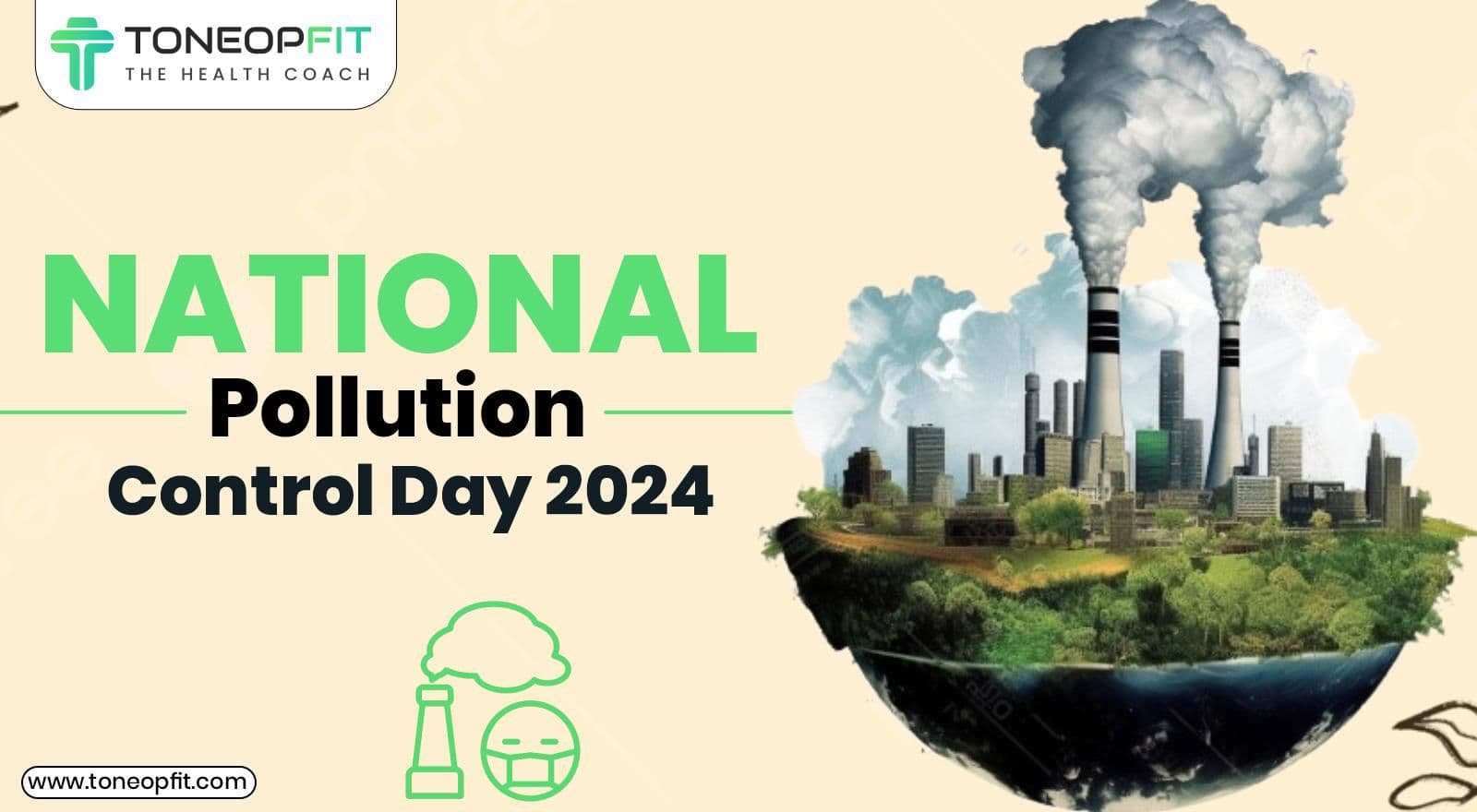National Pollution Control Day, celebrated on 2 December in India every year, is dedicated to creating and raising awareness about pollution and how we can prevent and control it. At a time when the entire planet is working towards a sustainable future, this day reminds us of the harmful effects of pollution on human health and the environment.
Let's go through the history, meaning and objectives of National Pollution Day and explore the health effects of pollution, pollution control awareness and the health benefits of a clean environment.
Table Of Contents
- National Pollution Control Day: History & Objectives
- 5 Health Effects Of Air Pollution
- Creating Awareness About Pollution Control
- Health Benefits Of A Clean & Pollution-Free Environment
- Pollution And Respiratory Diseases
- Expert’s Advice
- The Final Say
- FAQs
- References
National Pollution Control Day: History & Objectives
National Pollution Control Day is celebrated every year on December 2 to spread awareness about the harmful effects of pollution. The National Pollution Control Day was launched to memoralise the victims of the Bhopal Gas Tragedy that occurred on the night of 2 December, 1984. This chemical disaster was caused by the release of methyl isocyanate (MIC) gas from a pesticide factory and claimed thousands of lives.
This disaster exposed the world to the extreme danger of industrial pollution and highlighted the need for strict environmental policies and better pollution control measures. In response to this tragedy, the Indian government implemented a series of measures aimed at improving pollution control, regulating industrial emissions and preventing similar incidents in the future.
National Pollution Control Day aims to achieve several key objectives, including:
- Remember the Bhopal Tragedy: The day serves as a reminder of the Bhopal gas tragedy and its lasting impact on the country. It serves as a wake-up call for the need for better disaster management and pollution control measures.
- Raise awareness: Helps inform people about various sources of pollution, including industrial emissions, waste disposal, vehicle emissions and deforestation.
- Promote sustainable practices: Encourages individuals, organisations and governments to adopt sustainable industrial practices to reduce environmental pollution and disasters and protect public health.
- Support for policy implementation: The day also serves as a platform to advocate for stronger environmental policy and its effective implementation.
- Inspire Action: National Pollution Control Day aims to inspire action at all levels of society to take proactive steps to control pollution.
Also Read: World AIDS Day 2024: Importance of Awareness, Effective Prevention, and Fighting Stigma Together
5 Health Effects Of Air Pollution

Here are some of the health effects of air pollution:
1. Heart And Cardiovascular Problems
If the pollutants that one inhales penetrate deep into the human body and enter the bloodstream, a number of health problems can arise that require assessment by the best cardiologists. Since the amount of oxygen reaching the organs is reduced due to polluted air, this can lead to a decrease in blood production. Lead or carbon monoxide poisoning can cause muscle problems, mobility problems, high blood pressure and heart disease.
2. Neurological And Birth Problems
Pregnant women exposed to air pollution have increased levels of toxic chemicals in their blood, which can tax the immune system. Polluted air, when it reaches the fetus, can cause problems such as low birth weight or premature birth. Additionally, permanent neurological problems such as reduced learning ability and lower IQ may occur.
3. Skin Problems
Air pollution can damage your skin in many ways. It can aggravate skin conditions by increasing inflammation, causing acne, wrinkles, and premature ageing. It may also damage the skin’s protective barrier, leading to dryness and sensitivity.
4. Asthma And COPD
Polluted air is a major trigger for asthma and chronic obtrusive pulmonary disease. Inhaling the particles of polluted air can irritate the tissues in the nasal cavity, leading to coughs and runny noses. If the particles get deep into the lungs, they can cause an infection and cause inflammation that can lead to breathing problems.
5. High Blood Pressure In Women
Air pollution has shown a higher risk of high blood pressure in women, as exposure to pollutants can lead to inflammation and put stress on the cardiovascular system. Studies show that women, especially those with pre-existing health conditions, may be more susceptible to the blood pressure-raising effects of long-term exposure to air pollution.
Also Read: Detox And Clean Your Lungs With These 5 Yoga Asanas And Pranayama!
Creating Awareness About Pollution Control
The importance of being informed about air pollution stems from the fact that every person is responsible for the production of pollutants. Whether we use internal combustion cars, old-fashioned stoves or fly on vacation, we all add a brick of "poor air quality" to the building block. However, many people need to realise this.
Raising awareness of air pollution is therefore key and we must educate people about air pollution's impact on the environment, which may easily encourage them to give up some of the most harmful activities.
There are several ways to raise awareness about air pollution in your community. Local governments have the power to implement programs that will truthfully inform their citizens about their impact on air quality. These initiatives include:
- Launching educational programs.
- Installation of air quality monitoring systems and provision of data to citizens.
- Informing citizens about permissible levels of formaldehyde and other pollutants.
- Create social media posts.
- Write blog posts and guest articles.
- Contacting elected officials can help you reach a wider audience and affect change regarding the pollution crisis.
By showing people authentic data, it can be possible to convince them to change their habits at least a little. Even if everyone helps a little and gives up one bad habit that contributes to air pollution, there may be a significant change in the quality of the air that we breathe.
Also Read: World Heart Day 2024: Theme, Motto And Engaging Activities To Promote Heart Health
Health Benefits Of A Clean & Pollution-Free Environment
Here are the benefits of living in a clean environment:
1. Prevents Infectious Diseases
A polluted environment can be a breeding ground for harmful germs that make people sick. These can include diarrhoea, typhus, and many other dangerous diseases. If these diseases are not treated carefully, they can lead to death. It is, therefore, important that people always keep their environment clean and free of pollution.
2. Improves Mental Health
When you are in a clean environment without any pollution, your mood and mental health are likely to be stable and uplifted. Reduced pollution levels can lead to improved mental health by decreasing stress and anxiety triggered by environmental toxins. Cleaner air promotes better brain function, improving mood, focus, and overall cognitive well-being.
3. Keeps You Fit
It may sound a bit exaggerated, but it turns out that it is actually true.
A pollution-free environment promotes better respiratory health, improves cardiorespiratory fitness and endurance, and enables individuals to do regular physical activity and maintain an active lifestyle.
4. Ensures A Constant Supply Of Clean Food
Most of the food we eat comes from fields, and anything we do can affect its nutrition and growth. No pollution ensures healthier soil, water, and air, which are essential for growing clean, nutritious foods. Reducing pollutants helps maintain sustainable farming practices and supports a constant supply of safe, uncontaminated food.
Also Read: Celebrate World Pneumonia Day 2024: Significance, Theme And Creative Ways to Raise Awareness!
Pollution And Respiratory Diseases
Air pollution harms everyone, but it can be especially harmful to people with lung disease. The polluted air irritates our respiratory system and airways, which may increase lung disease symptoms. Some types of air pollutants can go deep into the lungs and cause inflammation, exacerbating the condition, or increase the risk of lung infections such as bronchitis and pneumonia. There is evidence that breathing particulate matter (PM) plays a role in lung cancer development.
Air pollution is also a huge trigger for asthma and chronic obstructive pulmonary disease (COPD). Some evidence suggests that air pollution could increase the risk of serious illnesses from COVID-19.
If you are exposed to high levels of pollution during pregnancy, your baby may be more likely to develop asthma, whether or not you have asthma yourself. This underscored the importance of taking precautions to prevent pollution and, in turn, preventing pollution-related illnesses.
The Final Say
National Pollution Control Day is observed on December 2nd each year in India. It serves as a reminder of the harmful effects of pollution and the need for better control and prevention, and commemorates the victims of the 1984 Bhopal Gas Tragedy, highlighting the dangers of industrial pollution.
This day encourages awareness, promotes sustainable practices, and advocates for stronger environmental policies to protect public health. By reducing pollution, we not only improve air quality but also protect mental and physical health, prevent respiratory diseases, and ensure cleaner food and safer environments for future generations. Every small effort counts toward a cleaner, healthier planet.
FAQs
1. What is the theme of Pollution Day 2024?
The theme of National Pollution Control Day 2024 is "Clean Air, Green Earth: A Step Towards Sustainable Living". It emphasises the need for clean air and sustainable practices to combat environmental challenges.
2. Why is National Pollution Control Day celebrated?
The National Pollution Control Day was launched to commemorate the victims of the Bhopal gas tragedy that occurred on the night of 2 December 1984. This industrial disaster was caused by the release of methyl isocyanate (MIC) gas from a pesticide factory, killing thousands of people.
References
- https://pwonlyias.com/national-pollution-control-day/#:~:text=National%20Pollution%20Control%20Day%20is%20observed%20on%20December%202%20every,December%202%E2%80%933%2C%201984.
- https://www.niehs.nih.gov/health/topics/agents/air-pollution
- https://www.carehospitals.com/hi/blog-detail/how-air-pollution-effect-human-heart/
- https://www.quebec.ca/en/health/advice-and-prevention/health-and-environment/the-health-effects-of-air-pollution
- https://airly.org/en/raising-air-pollution-awareness-a-key-step-towards-cleaner-communities/#:~:text=The%20importance%20of%20air%20pollution%20awareness%20is%20based%20on%20the,people%20do%20not%20realize%20that
- https://environment.co/awareness-about-pollution/
- https://www.glogov.org/health-benefits-of-a-clean-environment/
- https://www.asthmaandlung.org.uk/living-with/air-pollution/your-lungs#:~:text=Being%20exposed%20to%20air%20pollution,more%20likely%20to%20develop%20asthma.
- https://www.pw.live/exams/upsc/national-pollution-control-day/
About ToneOp Fit
ToneOp Fit is a platform dedicated to improving and maintaining good health through a comprehensive range of goal-oriented health plans with up to 3 Coach support. With a range of Weight Management, Medical Condition, Detox Plans, and Face Yoga Plans, the app also provides premium health trackers, recipes and health content. Get customised diet, fitness, naturopathy & yoga plans and transform yourself with ToneOp.









































